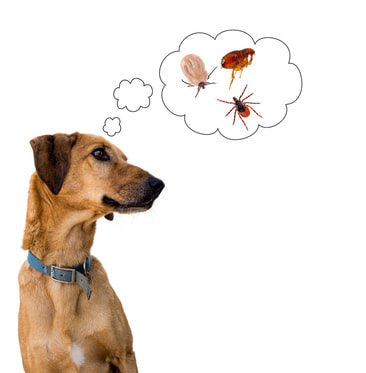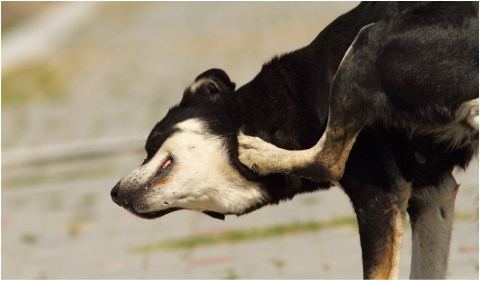Protecting Your Pet From Fleas and Ticks in Florida
Florida is beginning to heat up as we get close to Summer. Fleas and ticks have always been, and will become a problem for cats and dogs. Florida’s warm and humid climate is perfect for them to survive year-round. As the temperature begins to increase, fleas and ticks flourish best between 70 and 85 degrees. My hope is to help you protect your pet from issues that can be caused by a flea and tick infestation. Here is what you should know.
What are the Most Common Types of Fleas and Ticks in Florida?
The most common fleas are Cat Fleas. The most common ticks are Deer Ticks, American Dog Ticks, Brown Ticks and Lone Star Ticks.
More Than Just a Bite!
Some dogs are allergic to the flea bite which makes it even more of a problem. Other problems related to flea bites include can include, excessive licking and scratching, hot spots, skin irritation and infections. In extreme cases, and especially small breeds, it can cause anemia. Also, tapeworms use fleas as intermediate hosts.
Issues Caused by Fleas and Ticks
How Can I Protect my Pets From Fleas and Ticks?Topical Medications
Topical medications, also called “Spot On” are flea and tick medications that you apply directly into your pet’s coat. It is usually applied between the shoulders or at the base of the neck. Spot-on chemicals spread over the animal’s entire body, depositing into sweat glands of the skin, where the active ingredients are released over a period of several weeks. They will continue to work even if your pet is bathe or goes swimming.
The most commonly used topical flea and tick control: Frontline Plus, K9 Advantix, Advantage (Fleas Only), Revolution (also protects from heartworm and ear mites). Oral Medications
Oral medications are prescription only. Some of these medications can kill not only flea and ticks but some can also prevent heartworm disease and some internal parasite like whipworms, hookworms and roundworms. These are usually given on a monthly basis. There are side effects that can occur with these medications such as vomiting and diarrhea. Some animals develop a skin reaction causing redness, itching and/or hives. Depression and lack of appetite can occur as well.
The most commonly prescribed are Bravecto, NexGard, Capstar (flea only), Trifexis Shampoos
Shampoos can be used as an immediate method. Unfortunately they are only effective for a short period of time and will not prevent fleas and ticks from coming back. I don't usually like to use shampoos because their main ingredient, even though is effective is also toxic to pets and can cause irritation to the skin and eyes.
The only product in the market I have used that is not toxic is Quadrupet All in One shampoo. This natural shampoo contains Mojave Yucca, a natural root, that acts as an insecticide without irritating the skin or the eyes. A dip
Dips are a concentrated version of flea and tick shampoos, but these are not rinsed off the pet. Regularly they are applied with a sponge or poured over the body. Dips should never be use with young pets or nursing or pregnant animals. I never use these products at my shop nor do I suggest them to anyone. These liquids can be very irritating to the skin and eyes.
Collars
Using a collar contain chemicals that are released to your pets body, which kills fleas and ticks. Even though these products are readily available and inexpensive, I do not recommend long term use. The toxins in the ingredient most common in collars can cause interference with the pet's nervous system if overdosed.
How to Get Rid of Fleas and Ticks in the Home and Yard
The best time to start flea and tick control program is in the late spring (although in Florida I recommend constant protection), before infestation begins. The first steps include, cleaning and vacuuming all surfaces where pets live. This includes washing their beds and blankets. Make sure you check the walls and behind hanging frames when cleaning and treating areas in your house. Ticks are in the arachnid family so they live on walls.
As for the yard, keep your grass cut about 3 inches or shorter. Keep shrubs and bushes near your house pruned. When applying insecticides in your yard, do not forget to treat porches, fences and decks. Lastly, treat your garden and areas with mulch because ticks will hide wherever it is safe. My favorite insecticides are: Black Flag Ready to Spray Flea and Tick Concentrate Yard Spray, Ortho Bug Bgon Max Granules, and Spectracide Triazicide Insect Killer for Lawns Granules. Other insecticides include. There are liquid insecticides such as FenvaStar Eco Cap and Conquer Insecticide; flea aerosols such as Pivot Ultra, Ultracide, and Alpine. In closing, when looking for the best flea and tick prevention method, always seek advice from your veterinarian before starting any preventive medication on your beloved pets. |
Lourdes MassengillI love grooming and dogs are my life :-) Archives
November 2021
|
|
|
We offer 10% off every day for booking at least 6 weeks early,
as well as 10% off for seniors and military!
Call us today!
407-332-4400
© Copyright 2022 D'tails Pet Boutique & Spa. All Rights Reserved.



 RSS Feed
RSS Feed